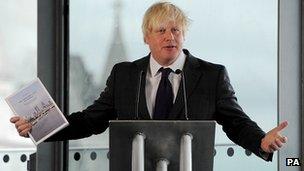Invest more in London or fall behind - Boris Johnson
- Published

Mr Johnson says policymakers need to respond to the likely rise in London's population
London Mayor Boris Johnson is calling for more investment in the city, warning that conceding advantages to global rivals would prove "fatal".
The capital's transport system is "over-stretched", with some Tube lines risking "breaching EU regulations for the carriage of live animals", he says.
Mr Johnson is also urging more investment in housing to cope with the expected rise in London's population.
His comments come two weeks ahead of the government's spending review.
BBC London's political editor Tim Donovan said there had been speculation that, having been cushioned from some of the toughest austerity in the run-up to the Olympics and Mr Johnson's re-election, London was about to receive a difficult financial settlement.
'Don't slacken off'
In his 2020 Vision document, external, the mayor warns that the capital's transport system is over-stretched and will become more so as the population grows to 8.7 million by 2016 and more than 9 million by 2021.
He says: "The Tube, bus and rail networks are already operating at capacity. On some lines, in the peaks, we are in danger of breaching EU regulations for the carriage of live animals."
Aimed at Chancellor George Osborne, the mayor writes that continuing with more infrastructure spending in the capital will bring benefits throughout the country.
"Those in government looking for the secret to jobs and growth should remember that Crossrail alone is expected to add £42bn to the UK economy," he says.
He adds that it would be "fatal - given the competition we face, and the population growth underway - to slacken off now".
Mr Johnson estimates that, over the next decade, London will have to create 450,000 jobs and 400,000 homes. Some 4,000 extra primary classes will be needed by 2020, he says.
Toll tunnels?
The mayor concedes the gap between rich and poor has grown in London, linking economic investment with preventing social unrest.
He says: "The French were decades ahead of Crossrail with their cross-town RER, and now they are going ahead with a series of RER extensions that will bring millions of people closer to centres of employment and opportunity - one of the most effective ways of tackling social exclusion and, to put it bluntly, avoiding riots."
The mayor calls for control of London suburban overground rail franchises
To cope with transport concerns he recommends more investment in cycle hire schemes, preparations for Crossrail 2, studies on extending the Tube south of the Thames and creating five more river ferry crossings.
Having scrapped the western extension of the congestion charge zone - foregoing at least £50m a year in revenue - the mayor suggests motorists might be asked to pay to drive through new tunnels, built to ease traffic flows.
"Should we revive the ambitions of the 1960s, but this time take account of environmental concerns by using a toll-funded tunnel?" he asks.
'More traffic'
To build more homes, the mayor calls for a long-term financial settlement and more strategic powers to make planning decisions.
He suggests removing the cap on councils' borrowing to build and setting up a London Housing bank, backed by pension funds, to "motivate"' the private rented sector.
Labour said the report suggested the mayor was "panicking about his legacy".
"Many of the aims in the report are laudable, but the mayor's failure to deliver any of this in the last five years doesn't fill us with confidence that he'll do them in his last three," said Len Duvall, Labour leader in the London Assembly.
"He has said nothing about tackling the cost of living crisis that is hitting Londoners' quality of life and driving some to desperate measures like using food banks to survive."
The Lib Dems said the strategy was insubstantial at a time when the mayor must "make the case for London to government".
"This document has come too late and may cost London dearly in the forthcoming spending review," said Caroline Pidgeon, head of the Lib Dem group in the London Assembly.
The Green Party called for a "fairer and greener" approach to managing London's long-term growth.
Darren Johnson, who represents the party in the London Assembly, said the mayor's plans would "deliver a city with a shortage of affordable housing and more traffic".
- Published29 May 2013
- Published29 May 2013